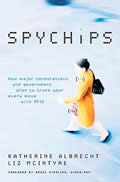Other
McIntyre
Articles:
Coming Soon
RFID VULNERABLE TO VIRUS ATTACKS
By Liz McIntyre & Katherine Albrecht
March
17, 2006
NewsWithViews.com
Privacy and civil liberties advocates have long been opposed to the use of RFID technology on consumer items and government documents because it can be used to track people without their knowledge or consent. But now security researchers are warning RFID systems are vulnerable to viruses that could wreak havoc on databases around the world and potentially facilitate a terrorist attack.
Melanie Rieback, a Ph.D.student at the Vrije Universiteit in Amsterdam, gave a live demonstration of how a hacker could deploy a single rogue RFID tag and infect associated databases at the Fourth Annual IEEE Conference on Pervasive Computing and Communications held in Pisa, Italy, March 15.
"Let's hope this puts the breaks on the irrational exuberance of Wal-Mart, Procter & Gamble, the Department of Homeland Security, and everyone else hell bent on tracking everything and everyone with this technology," say privacy advocates Katherine Albrecht and Liz McIntyre, co-authors of "Spychips: How Major Corporations and Government Plan to Track Your Every Move with RFID."
Radio Frequency IDentification (RFID) is a controversial technology that uses tiny microchips to track items from a distance. These RFID microchips have earned the nickname "spychips" because each contains a unique identification number, like a Social Security number for things, that can be read silently and invisibly by radio waves. Security experts have theorized that RFID would be targeted by hackers, but until now, most considered the limited memory on the tags insufficient to deliver such attacks.
Rieback backs up her demonstration with details about exactly how a virus could propagate in RFID systems in a paper aptly titled "Is Your Cat Infected with a Computer Virus?" The paper opens with a scenario in which a vet's database seems to be erasing data from pet tags and finally freezes, displaying the message "All your pet are belong to us." (This is a nod to the Internet joke "All your base are belong to us.")
This damage could start with one attacker writing malicious code onto his cat's microchip and exposing it to the vet's system, she claims. But that's just the start. Her university's press release about the discovery points out how such malicious code could infect retail databases and even RFID-based airport baggage systems, leading to more serious consequences, like a terrorist debilitating a baggage database in order to slip in a lethal suitcase:
"A malicious individual could put an infected RFID tag on his suitcase (or someone else's suitcase). The bag will be scanned when approaching a Y-junction, to determine which direction it should go. However the mere act of scanning could infect the airport's baggage database, and as a result, all bags checked in after could receive infected baggage labels. As these bags move to other airports, they would be rescanned -- and within 24 hours, hundreds of airports could be infected worldwide. A smuggler or terrorist using this technique could hide baggage from airline and government officials."
The university researchers recommend that developers incorporate countermeasures to "help reduce the threat of RFID viruses." They point out that these measures "take time, people, and money to implement" and urge RFID developers to take action before their software is widely deployed.
"We've long contended that RFID will put all of us at risk," says McIntyre. "This is a wake-up call to RFID proponents who are recklessly rushing the technology into the marketplace before the serious societal consequences of tracking everyday objects and people with this technology can be fully explored."
� 2006 - Liz McIntyre - All Rights Reserved
Sign Up For Free E-Mail Alerts
E-Mails are used strictly for NWVs alerts, not for sale
Liz McIntyre is a consumer privacy expert and author of Spychips: How Major Corporations and Government Plan to Track your Every Move with RFID. In this explosive book, McIntyre and co-author Katherine Albrecht reveal how organizations like Procter & Gamble, Gillette, Wal-Mart, and even the U.S. Postal Service plan to use tiny computer chips smaller than a grain of sand to track everyday objects-and even people-keeping tabs on everything you own and everywhere you go.
Katherine Albrecht is a privacy advocate and co-author of Spychips: How Major Corporations and Government Plan to Track your Every Move with RFID. Albrecht has testified on RFID technology before the Federal Trade Commission, the California state legislature, the European Commission, and the Federal Reserve Bank, and she has given over a thousand television, radio and print interviews to news outlets all over the world. Her efforts have been featured on CNN, NPR, the CBS Evening News, Business Week, and the London Times, to name just a few.
Web Sites: SpyChips.com and NoCards.org
E-Mail: liz@spychips.com
"A malicious individual could put an infected RFID tag on his suitcase (or someone else's suitcase). ...














